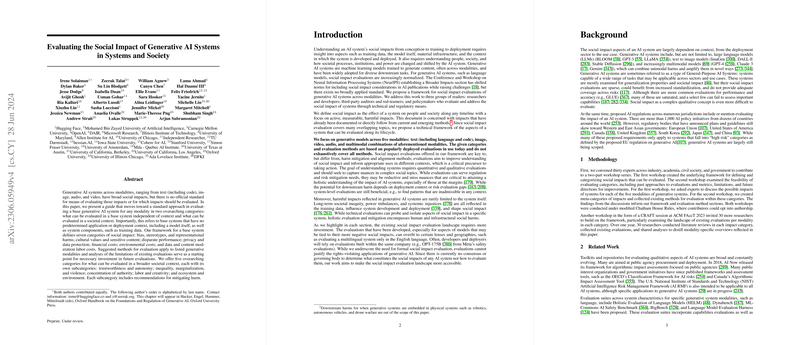Evaluating the Social Impact of Generative AI Systems in Systems and Society
The paper "Evaluating the Social Impact of Generative AI Systems in Systems and Society" provides a framework for assessing the multifaceted social implications of generative AI models across text, image, audio, and video modalities. Given the widening application and integration of such systems into various aspects of daily life and industry, it is imperative to understand their social impact through a structured evaluation methodology. The authors propose a comprehensive framework that categorizes the impacts into two principal domains: the technical base system and people and society.
Technical Base System Evaluation
The evaluation framework for the technical base system delineates seven key categories: bias, stereotypes, and representational harms; cultural values and sensitive content; disparate performance; privacy and data protection; financial costs; environmental costs; and data and content moderation labor costs. These categories are intended to provide a broad lens for evaluating systemic social impacts from development to deployment. Beyond these categories, the paper highlights the technical challenges and limitations inherent in evaluating these dimensions.
- Bias and Representation: The paper discusses biases embedded within AI models, addressing the complex interaction between statistical, system, and human biases. Common evaluation techniques include examining association tests and detecting stereotypes and co-occurrences. Despite this, existing evaluations often lack the ability to fully capture contextual nuances and intersectional biases.
- Environmental Costs: Training and deployment processes for large-scale models are resource-intensive, contributing to environmental concerns. The paper calls for the development of more standardized metrics to capture the total environmental footprint, incorporating both the calculation of emissions from datacenter usage and broader emissions from hardware production.
- Data and Labor: Highlighting the often-overlooked labor aspects, the authors emphasize the ethical concerns surrounding the use of crowdworkers in AI development, noting the need for fair working conditions and transparency.
Societal Impact Evaluation
At the societal level, the paper divides impacts into categories including trustworthiness and autonomy, inequality and violence, concentration of authority, labor and creativity, and ecosystem and environment. This multidimensional approach acknowledges the complex and interwoven effects generative AI systems have on social structures.
- Trust and Overreliance: The trustworthiness of AI outputs and potential overreliance are critical. The paper articulates concerns over misinformation and the anthropomorphic misapprehension that may unduly amplify user reliance on AI systems. Evaluations are needed to assess the impacts of AI on public trust in media and information dissemination.
- Inequality and Marginalization: Generative AI can both exacerbate and mirror social inequities. Here, evaluations should attend to community erasure, amplified marginalization, and disparities in service quality across different demographic groups. Such evaluations are complex and critically depend on contextualized and participatory methodologies to be effective.
- Economic and Labor Market Implications: The paper notes the potential for generative AI to influence the labor market by altering job landscapes and contributing to widened economic inequalities. The paper suggests necessary policymakers and developers consider inclusive design processes and labor protections.
Implications and Future Directions
This work presents a detailed guide for assessing the societal and systemic effects of generative AI, providing an imperative layer of accountability and oversight. The proposed evaluation framework offers a roadmap to understanding the dynamic interplay between AI systems and societal structures, thereby promoting comprehensive and more ethical technology deployment. However, due to the unique interplay of social, cultural, and economic contexts, the authors also recognize that evaluations must be adaptable and continuously refined to capture evolving societal values and emerging risks.
Looking forward, the development of AI evaluation frameworks needs integration with broader policies and regulatory landscapes, to ensure AI systems are deployed with due consideration of their long-term societal impacts. Collaborative efforts across researchers, developers, policymakers and affected communities are essential to address these challenges effectively. As the AI landscape continues to evolve, so must the methodologies for evaluating its social impact. The authors call upon the research community to expand upon this framework, contributing further to the corpus of knowledge required to ethically navigate the complexities introduced by generative AI systems.
